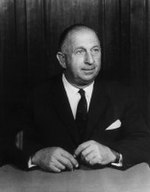Henry Bolte
|
Sir Henry Bolte GCMG |
|
|---|---|
 |
|
| 38th Premier of Victoria | |
|
In office 7 June 1955 – 23 August 1972 |
|
| Deputy | Sir Arthur Rylah (1955–1971) Sir Dick Hamer (1971–1972) |
| Preceded by | John Cain, Sr. |
| Succeeded by | Sir Rupert Hamer |
| Member of the Victorian Parliament for Hampden |
|
|
In office November 1947 – August 1972 |
|
| Preceded by | Raymond Hyatt |
| Succeeded by | Tom Austin |
| Personal details | |
| Born | 20 May 1908 Ballarat, Victoria, Australia |
| Died | 4 January 1990 (aged 81) Ballarat, Victoria, Australia |
| Nationality | Australian |
| Political party | Liberal Party of Australia |
| Spouse(s) | Edith Lilian "Jill" Elder |
| Religion | Anglican |
Sir Henry Edward Bolte GCMG (20 May 1908 – 4 January 1990) was an Australian politician. He was the 38th and longest serving Premier of Victoria.
Henry Bolte (pronounced [boltə]) was born in Ballarat, the son of a publican of German descent. He was to spend the first 24 years of his life (apart from three years at boarding school) in the small western district town of Skipton. He was educated at Skipton primary school and Ballarat Grammar School: he was the last Victorian Premier not to attend a university. After working in various manual jobs he married Edith Elder in 1934 and bought a small farm at Bamganie near Meredith, where he lived for the rest of his life, running sheep and cattle.
In 1940 Bolte joined the Australian Army and served as a sergeant with a training regiment until 1945. After the war he returned to farming and became active in the newly formed Liberal Party. At the 1945 election he stood unsuccessfully for the seat of Hampden in the Victorian Legislative Assembly, but in 1947 he stood again and was elected.
Victorian politics was volatile at this time, with a succession of weak short-term governments. The electoral system was malapportioned in favour of rural areas, which gave the minority Country Party disproportionate power. As a rural Liberal, Bolte despised the Country Party nearly as much as the Labor Party. In April 1935 Albert Dunstan (Deputy Premier and leader of the Country Party) unexpectedly withdrew support for the Premier, Stanley Argyle, breaking the coalition agreement and forming a minority Country Party government, which Labor supported in return for some policy concessions.
...
Wikipedia
